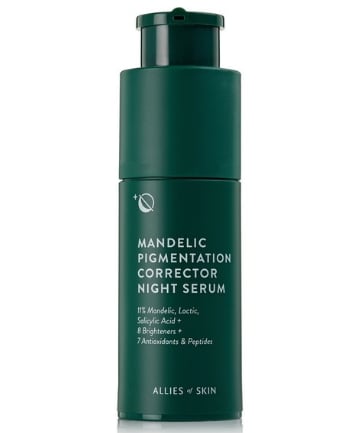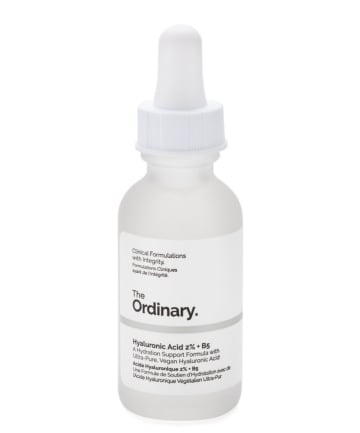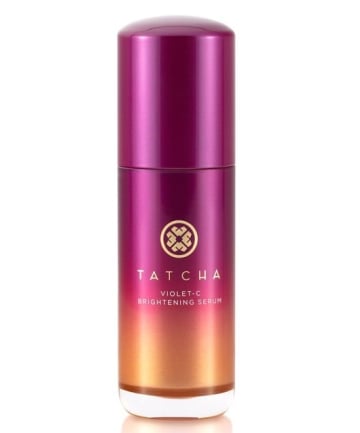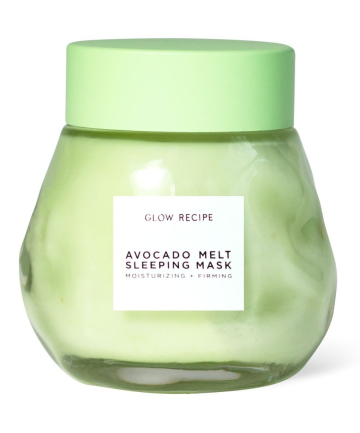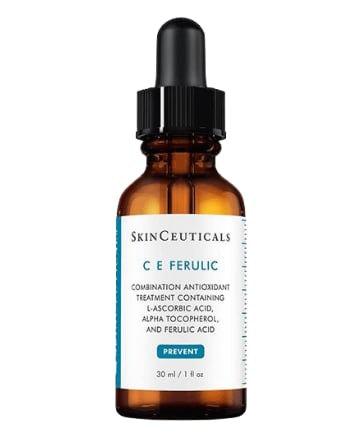You may have heard the term "mandelic acid" popping up every now and then. As with lactic, citric and glycolic acids, it's an alpha hydroxy acid, this time derived from almonds. "It's gaining popularity as a glycolic stand-in," says Gohara.
If you like mandelic acid, try: Allies of Skin Mandelic Pigmentation Corrector Night Serum, $92
Buy now
If you like mandelic acid, try: Allies of Skin Mandelic Pigmentation Corrector Night Serum, $92
Buy now
Though we tend to associate the term "acid" with exfoliants, hyaluronic acid is actually a humectant moisturizer. Gohara says that it's naturally present in skin, though your body produces less as you age. "It's wonderful at plumping the skin," says Gohara. "In fact, many fillers are made with this." She adds that it's great for adding smoothness and brightness to skin. "I won't leave the house without putting it on topically," she declares.
Another bonus? "It almost never causes an allergic reaction," Guanche says. "I can't think of a single side effect to report."
If you like hyaluronic acid, try: The Ordinary Hyaluronic Acid 2% + B5, $6.80
Buy now
Another bonus? "It almost never causes an allergic reaction," Guanche says. "I can't think of a single side effect to report."
If you like hyaluronic acid, try: The Ordinary Hyaluronic Acid 2% + B5, $6.80
Buy now
Also known as vitamin C, ascorbic acid is "one of the most potent antioxidants for skin," Gohara says. "It's good for daily use to help fight damage from pollution and UV light. It also helps with fine lines, and can even out your complexion and overall skin texture." Additionally, the ingredient is known for its ability to combat dark spots and hyperpigmentation.
Lorencin notes that it can be especially effective when used in conjunction with retinol or hyaluronic acid. Though be sure to use caution: "It's great for most skin types, but it can be irritating to sensitive skin, especially if you're prone to rashes," she says.
If you like ascorbic acid, try: Tatcha Violet-C Brightening Serum, $88
Buy now
Lorencin notes that it can be especially effective when used in conjunction with retinol or hyaluronic acid. Though be sure to use caution: "It's great for most skin types, but it can be irritating to sensitive skin, especially if you're prone to rashes," she says.
If you like ascorbic acid, try: Tatcha Violet-C Brightening Serum, $88
Buy now
"Polyhydroxy acids are a newer generation of alpha hydroxy acids," explains Guanche. "They are milder and less irritating (or stingy) when applied, but they still micro-exfoliate the skin." Since it's a larger molecule, PHAs are able to "remove the surface of dead skin cell layers without penetrating too deeply in the skin," which translates to less irritation, explains Guanche. She also notes that they're great for improving pigment, fine lines and even hydration (thanks to the fact that it's also a humectant).
Also, its gentleness makes it great for sensitive skin: "It's especially good for skin prone to rosacea and eczema and mature compromised complexions," says Lorencin.
If you like polyhydroxy acid, try: Glow Recipe Avocado Melt Sleeping Mask, $45
Buy now
Also, its gentleness makes it great for sensitive skin: "It's especially good for skin prone to rosacea and eczema and mature compromised complexions," says Lorencin.
If you like polyhydroxy acid, try: Glow Recipe Avocado Melt Sleeping Mask, $45
Buy now
You'll often see ferulic acid used in conjunction with vitamins C and E. "Vitamin C especially tends to be unstable in formulation, but the ferulic acid helps it maintain stability," Guanche says. "It has antioxidant effects and reduces damage caused to the skin by free radicals."
If you like ferulic acid, try: SkinCeuticals C E Ferulic with 15% L-Ascorbic Acid, $166
Buy now
If you like ferulic acid, try: SkinCeuticals C E Ferulic with 15% L-Ascorbic Acid, $166
Buy now


